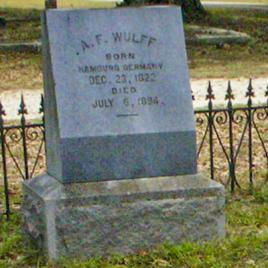Pioneer Information
Born in Hamburg, Germany, Wulff immigrated to the United States in June 1848, arriving in San Antonio, Texas, after unsuccessful attempts at finding work in New York City, Cincinnati, and New Orleans. He was eventually employed as a store clerk, and, in 1852, opened a dry-goods business in nearby Fredericksburg, Texas, with partner James R. Sweet. Wulff soon opened additional stores in other towns. During the Civil War, he supplied corn to both U.S. and Confederate troops and was accused of being a spy. Amidst this intrigue, and following an attempt by a Confederate officer to kidnap him, Wulff relocated his family to Hamburg, having established a residence for himself in Mexico. Wulff and his family returned to San Antonio only after the war ended.
Wulff was an avid gardener. He adorned the grounds of his personal residence, an Italianate mansion built in 1870 and occupying an entire block in downtown San Antonio, with geranium-lined footpaths, fishponds, and a variety of trees, shrubs, and herbaceous plantings. He served two terms as a city alderman (from the Fourth Ward, a predominately German precinct) and, in 1885, was appointed the city’s first park commissioner, planting trees and shrubs on the city’s public plazas at his own expense. In 1889, he initiated resolutions to enhance Alamo Plaza, installing a planted garden at its center, which he designed and supervised, and 30 iron benches around the square. Some sources suggest that it was Wulff who, in 1888–1889, paved the four streets bounding Alamo Plaza with mesquite blocks. Wulff died on July 6,1894, and is buried in San Antonio’s City Cemetery No. 1.



